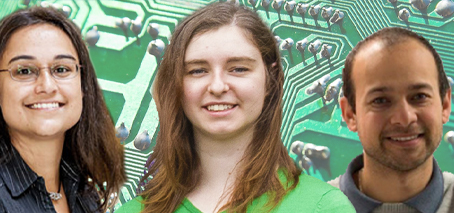-
14 Mar 2019
7:00 pm - 8:30 pm
Computing has transformed the world, but there is a price: the huge amount of energy being consumed by massive, factory-sized data centres means that information and communications technology (ICT) already consumes about 8% of global electricity, and is doubling every decade. ICT now has the same global-warming contribution as the aviation industry.
At the same time, we are running out of achievable ways to improve the efficiency of existing, silicon-based (CMOS) electronics. ‘Moore’s Law’, which for 60 years predicted ever-smaller, ever-more-efficient computer components, is expected to be declared officially dead in next ten years. Without a ‘beyond CMOS’ solution, energy will become the limiting factor on further computational growth in the next one or two decades, severely limiting our potential to expand Artificial Intelligence, an Internet of Things, and ‘self-drive’ vehicles. For computing to continue to grow, we need to develop new electronics that consume much less energy.
Join us for an electrifying panel where three scientists from FLEET will describe new fields of physics and new materials in which electrical current can flow with much lower energy wastage.
Associate Professor Meera Parish is a theoretical physicist at Monash University, where she investigates the fundamental behaviour of quantum particles and how they organise into exotic states of matter, such as superfluids. These states could form the basis of new ultra-low energy electronics.
Dr Carlos Kuhn studies ultra-cold atomic gases at Swinburne University of Technology, investigating the behaviour of atoms at a millionth the temperature of outer space. As a passionate science educator, Carlos has used water-powered rockets to inspire students to study science!
Rebecca Orrell-Trigg is a PhD student recently transferred to UNSW from RMIT University, where she has used liquid metals to synthesise two-dimensional materials for future electronic devices. This work allows her to apply her inorganic chemistry knowledge in a practical setting, and use her extensive experience with touch printing.
Venue: Royal Society of Victoria
Venue Website: https://rsv.org.au/
Address:
